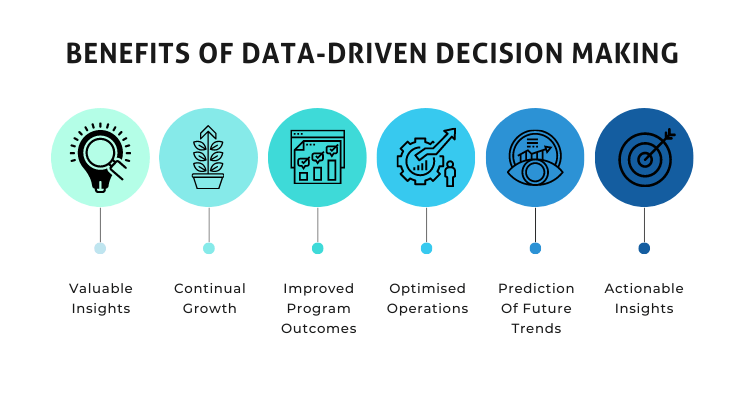The Role of Data Analytics in Crafting Effective Marketing Strategies
In the business world, staying ahead of the competition requires not just intuition, but strategic decision-making backed by solid evidence. In this digital age, where information is abundant and consumer behavior is constantly changing, businesses need to leverage the power of data analytics to craft effective marketing strategies. Data has become the lifeblood of business operations, so it’s no surprise that it plays an important role in modern sales and marketing.
The data generated in the last two years alone exceeds all the data created throughout human history up to that point. This explosion of information is transforming the way businesses engage with their customers, and understanding its significance is essential for staying ahead in the game. It’s the key to understanding the secrets of consumer behavior and refining your marketing strategies. In this blog, we will explore the pivotal role that data analytics plays in shaping modern marketing approaches and how businesses can harness their potential to drive success.
- What is Data?
- Data can be classified into three different types
- Importance Of Data In The Changing Landscape Of Sales And Marketing
- Understanding the Data-Driven Paradigm
- Customer Segmentation and Targeting
- Predictive Analytics for Anticipating Trends
- Enhancing Personalization in Marketing
- Optimizing Marketing Channels and Campaigns
- Measuring and Improving Marketing ROI
- Real-Time Analytics for Agile Decision-Making
- Challenges and Considerations
- Conclusion

Want to Skyrocket Your Website Traffic? Discover the Secret with Our Proven SEO Strategies!
Discover the key to unlocking the potential of SEO and attracting high-quality, targeted traffic to your website.
What is Data?
Data refers to raw facts, statistics, or information that can be collected, recorded, stored, and analyzed. It can take various forms, including numbers, text, images, audio, video, and more. Data can be generated from a wide range of sources, such as sensors, surveys, social media interactions, online transactions, and countless other sources. In 2023 alone, around 2.5 quintillion bytes worth of data are generated each day, translating to 44 zettabytes worth of data in the entire digital platform.

Data is fundamental to making informed decisions and gaining insights in various fields, including business, science, technology, healthcare, and more. In the context of modern sales and marketing, data can encompass information about customers, their behavior, preferences, demographics, purchase history, and much more. This data is invaluable for crafting targeted marketing strategies, personalizing customer experiences, and optimizing business operations.
Data can be classified into three different types
- Structured Data: This type of data is highly organized and easy to analyze. It’s typically stored in databases and can be in the form of tables with rows and columns. Examples include customer names, addresses, purchase dates, and product prices.
- Unstructured Data: Unstructured data lacks a predefined structure and can be more challenging to analyze. Examples include text data from social media posts, images, audio recordings, and video content.
- Semi-structured Data: Semi-structured data falls in between structured and unstructured data. It has some level of organization, often using tags or labels, but it may not follow a rigid structure. Examples include XML and JSON data.
Importance Of Data In The Changing Landscape Of Sales And Marketing
Data plays a pivotal role in formulating your business strategies, enabling your company to attain superior outcomes and foster effortless growth by guiding the marketing choices for your brand. Consequently, the practice of data-driven marketing assumes paramount significance as it furnishes invaluable insights into the efficacy of your digital marketing initiatives.

Source: LinkedIn
Understanding the Data-Driven Paradigm
Data analytics involves the use of advanced technologies and statistical methods to analyze, interpret, and draw meaningful insights from large sets of data. In the realm of marketing, this means tapping into the vast pool of information generated by consumer interactions, online behaviors, and market trends. By employing data analytics, businesses can move beyond traditional guesswork and make informed decisions based on real-time data.
Customer Segmentation and Targeting
One of the fundamental ways data analytics contributes to marketing success is through customer segmentation and targeting. Instead of adopting a one-size-fits-all approach, businesses can use data to identify distinct customer segments with specific preferences and behaviors. By understanding the unique needs of each segment, marketers can tailor their messages, promotions, and offers to resonate more effectively with their target audience. This not only enhances customer satisfaction but also maximizes the efficiency of marketing efforts and resources.
Predictive Analytics for Anticipating Trends
Predictive analytics is a powerful tool that enables businesses to anticipate future trends and customer behaviors based on historical data patterns. By analyzing past performance and identifying correlations, businesses can make data-driven predictions about upcoming market trends, customer preferences, and product demand. This foresight allows marketers to proactively adjust their strategies, ensuring they stay ahead of the curve and capitalize on emerging opportunities.
Enhancing Personalization in Marketing
Consumers today expect personalized experiences, and data analytics is the key to delivering them. By collecting and analyzing data on individual preferences, purchase history, and online behaviors, businesses can create highly personalized marketing campaigns. Personalization not only fosters a deeper connection between the brand and the consumer but also significantly increases the likelihood of conversion. Whether it’s personalized product recommendations, targeted promotions, or customized content, data-driven personalization is the cornerstone of successful modern marketing.
Optimizing Marketing Channels and Campaigns
In the vast digital landscape, businesses deploy marketing campaigns across various channels, including social media, email, search engines, and more. Data analytics helps in assessing the performance of each channel and campaign, providing insights into what works and what doesn’t. By understanding which channels yield the highest return on investment (ROI), marketers can allocate their resources more effectively, ensuring a higher impact on their marketing efforts. This optimization process is crucial for staying agile in the dynamic digital environment.
Measuring and Improving Marketing ROI
Return on Investment (ROI) is a critical metric for any marketing campaign, and data analytics plays a pivotal role in measuring and improving it. By tracking and analyzing the performance of marketing initiatives, businesses can calculate their ROI accurately. This not only provides insights into the success of past campaigns but also guides future decision-making. Data analytics allows marketers to identify which strategies are delivering the best results, enabling them to refine their approach and allocate resources more efficiently.
Real-Time Analytics for Agile Decision-Making
In the fast-paced world of marketing, real-time analytics empowers businesses to make agile and informed decisions. By monitoring key performance indicators (KPIs) in real-time, marketers can quickly identify trends, assess campaign effectiveness, and respond promptly to changing market dynamics. This agility is invaluable, especially in a landscape where consumer preferences and market conditions can shift rapidly. Real-time analytics ensures that marketing strategies remain adaptive and responsive, maximizing their impact.
Challenges and Considerations
While the benefits of data analytics in marketing are undeniable, businesses must also navigate challenges associated with data privacy, security, and ethical considerations. As data becomes increasingly integral to marketing strategies, maintaining the trust of customers and safeguarding their sensitive information is paramount. Striking the right balance between data-driven insights and respecting privacy is crucial for sustainable success in the digital era.

Struggling to Rank Higher on Google? Learn How Our Expert Tips Can Boost Your SEO!
Take control of your online presence and dominate the search engine results pages with our proven SEO tactics.
Conclusion
The role of Data Analytics in crafting effective marketing strategies cannot be overstated. From customer segmentation and predictive analytics to personalized marketing and real-time decision-making, data-driven approaches are reshaping the way businesses connect with their audience. As technology continues to advance, and the volume of data grows, businesses that embrace and harness the power of data analytics will undoubtedly gain a competitive edge in the market. The future of marketing is undeniably data-driven, and those who leverage this power will not only survive but thrive in the dynamic and ever-changing business landscape.
Gandhi Technoweb Solutions is a leading Digital Marketing Agency in India offering all kinds of services like SEO, CRO, PPC, Digital marketing, and Social Media Marketing at affordable prices enables you to achieve excellent ROI and international business growth. For further information, please contact us today.
Want To Grow Your Business Online Visit the #1 Digital Marketing Company in India. Request a FREE Quote Now.









